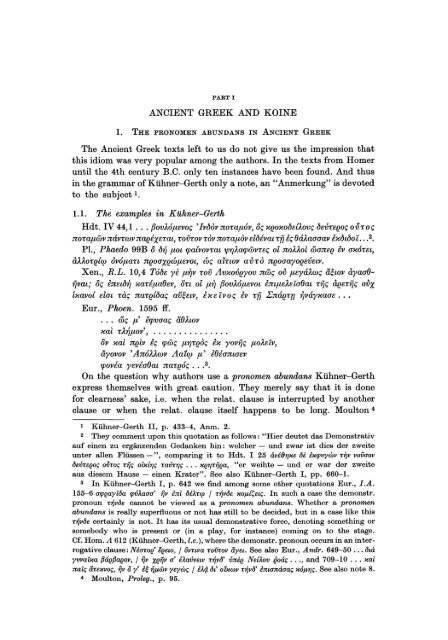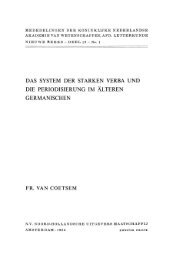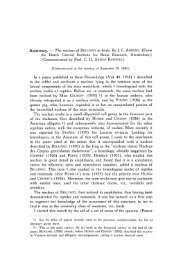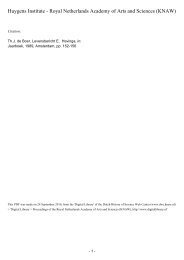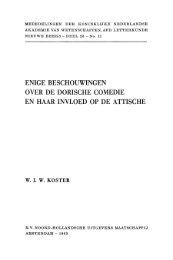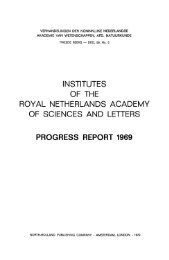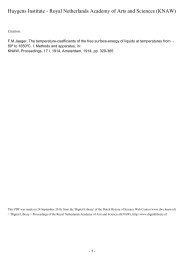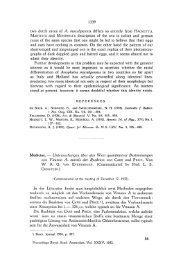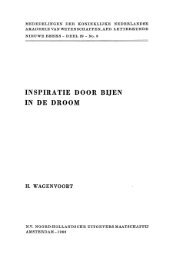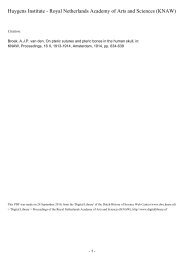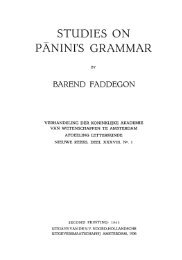Pronomen Abundans and Pronomen Coniunctum. A ... - DWC
Pronomen Abundans and Pronomen Coniunctum. A ... - DWC
Pronomen Abundans and Pronomen Coniunctum. A ... - DWC
Create successful ePaper yourself
Turn your PDF publications into a flip-book with our unique Google optimized e-Paper software.
PART I<br />
ANCIENT GREEK AND KOINE<br />
1. THE PRONOMEN ABUNDANS IN ANCIENT GREEK<br />
The Ancient Greek texts left to us do not give us the impression that<br />
th is idiom was very popular among the authors. In the texts from Homer<br />
until the 4th century B.C. only ten instances have been found. And thus<br />
in the grammar of Kühner-Gerth only a note, an "Anmerkung" is devoted<br />
to the subject 1.<br />
l.1. The examples in K ühner-Gerth<br />
Hdt. IV 44,1 ... f3ovÄ6ftevoç 'Ivè'Jov n07:aftóv, 8ç 'X[!o'Xoè'JeO.ovç è'Jev'te[!oç 0 {j't 0 ç<br />
n07:aftwv náv'twv na[!éxe7:at, 'tov'tov 'tov no'taftov eiè'Jévat 'tti èç ()á).,aaaav è'Xè'Jtè'Jo ï . .. 2 •<br />
PI., Phaedo 99B 8 è'J1} ftOt g;a{vov'tat 1p'fJ).,ag;wvuç olnoÀÀoi wane[! èv a'Xóut,<br />
àÀÀo't[!tcp ovóftan n[!oax[!wftevot, wç atnov a'lho n[!oaayo[!evetv.<br />
Xen., R.L. 10,4 Tóè'Je yè W;jV 'tov Av'Xov[!yov nwç ov fteyá).,wç açwv àyaa()<br />
ijVat; 8ç ènetè'J~ 'Xadfta()ev, ön ol ft~ f3ovÄ6ftevot lntfteA.eïa()at 'tijç à[!e'tijç OVX<br />
[MVO{ eiat 'tàç na't[!{è'Jaç av$etv, è'Xelvoç èv 'tti Iná[!7:Tl ~váy'Xaae . ..<br />
Eur., Phoen. 1595 ff.<br />
. . . wç ft' 19;vaaç ä.e).,wv<br />
'Xai 7:).,1}ftov', ............•..<br />
8v 'Xai n[!iv lç g;wç ft'fJ7:[!OÇ è'X yovijç ft0).,eïv,<br />
ayovov 'Anó).,).,wv Aatep ft' è()éantaev<br />
g;ovéa yevéa()at na7:[!óç ... 3 .<br />
On the question why authors use a pronomen abundans Kühner-Gerth<br />
express themselves with great caution. They merely say that it is do ne<br />
for clearness' sake, i.e. when the relat. clause is interrupted by another<br />
clause or when the relat. clause itself happens to be long. Moulton 4<br />
1 Kühner-Gerth Il, p. 433-4, Anm. 2.<br />
2 They comment upon this quotation as follows: "Hier deutet das Demonstrativ<br />
auf einen zu ergänzenden Gedanken hin: welcher - und zwar ist dies der zweite<br />
unter allen Flüssen - ", comparing it to Hdt. I 25 àVÉ{}rl'~E (je bupvywv T~V vovuov<br />
IJetTrEeOç OVTOÇ Tijç ol"{1'}ç TatlT1'}ç ••• "e1'}Tijea, "er weihte - und er war der zweite<br />
aus diesem Hause - einen Krater". See also Kühner-Gerth I, pp. 660-1.<br />
3 In Kühner-Gerth I, p. 642 we find among some other quotations Eur., I.A.<br />
155-6 ucpeayi(ja qnJÀaulf' ijv inl (jÉÀTlP / T~V(jE "op.tt;uç. In such a case the demonstr.<br />
pronoun T~V(jE cannot be viewed as a pronomen abundans . Whether a pronomen<br />
abundans is really superfluous or not has still to be decided, but in a case like this<br />
T~V(jE certainly is not. It has its usual demonstrative force, denoting something or<br />
somebody who is present or (in a play, for instanee) coming on to the stage.<br />
Cf. Hom. A 612 (Kühner-Gerth, l.c.), where the demonstr. pronoun occurs in an interrogative<br />
clause: NÉUTOe' EeEW, / övTtva TOVTOV liyE! . See also Eur., Andr. 649-50 ... lJIà<br />
yvvai"a f3áef3aeov, / ijv xefiv u' iÀavvuv T~V(j' vnee NelÀov éoáç . .., <strong>and</strong> 709-10 ... "al<br />
naiç liTEXVOÇ, ijv Ö y' i~ TJp.wv yEywÇ / iMf. IJl' ol"wv T~V(j' imunáuaç "óp.1'}ç. See also note 8.<br />
4 Moulton, Proleg., p. 95.


